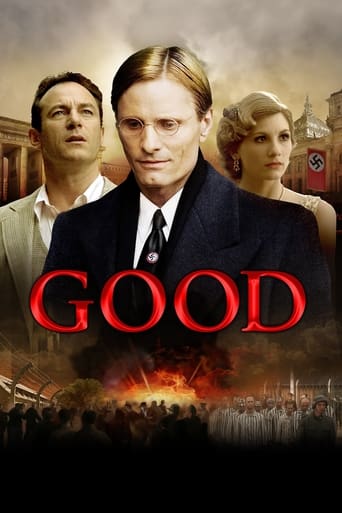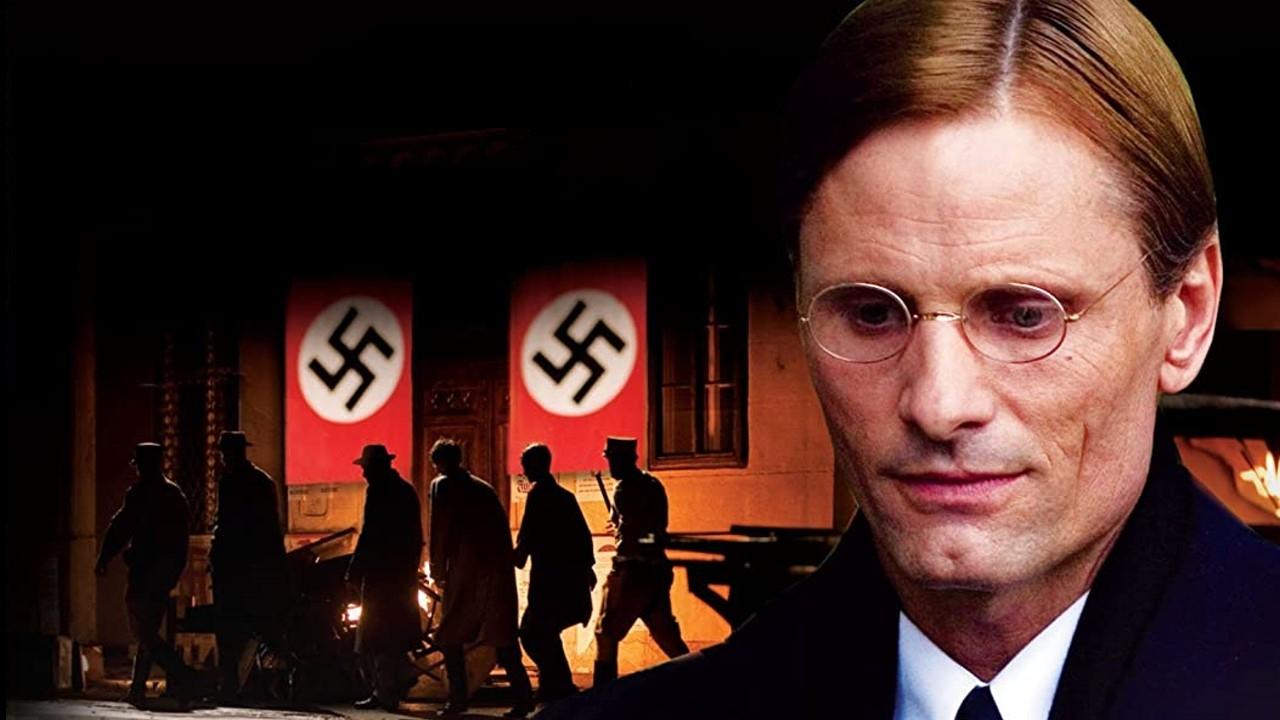petrander
I don't really understand the negative reviews. I loved this movie. It made a huge impression on me and a lot to think about afterwards. What makes a person good?
Kirpianuscus
a film about the Third Reich. about choices, attitudes and fear. about decisions. in fact, about the human nature. Viggo Mortensen does a beautiful work for the art to give precise sketches of gestures and words of a man who becomes hostage of history. because this is the inspired way to translate a state who , for the viewer, could be an obscure hypothesis. it is not the picture of a weak man but the image of a man out of his rules, front to a strange world. this is the source of poetry of this bitter and heavy film.
rps-2
Perhaps a little "artsy-dartsy", yes. But this is still a very compelling film that shows the many shades of grey that existed between the black and the white of most war movies. It's the story of a typical German --- a young professor --- who gets swept up in events as he goes along to get along. He sees Nazism as a temporary aberration and even believes he can have a positive influence on it but gets swept up in the movement without really believing in it. Life could be good in Germany before the war if you were not Jewish and were a Nazi or at least appeared to be one. Thus are Professor John Holden and his Jewish friend and fellow world war veteran Maurice caught in the vortex. There are a few extraneous lines in the plot: Holden's senile mother, his failed marriage and the reason for it. They don't seem to serve any purpose other than to add some flesh to a fairly skinny plot. But nevertheless it is both a powerful, well performed drama and a very different glimpse into the everyday life of Nazi Germany before the war.
James Hitchcock
One might have thought that the Third Reich is a subject which has been done to death in the cinema, yet occasionally a film turns up which is able to shed new light on the subject. "Good" came out in 2008, the same year as "The Reader", another film about Nazism, but one which was much more widely publicised. John Halder is a young lecturer in the literature department of a German university in the 1930s. (Although the film is set in Germany, the first names of most characters are anglicised- for example John and Maurice rather than Johann and Moritz). When the Nazi Party comes to power in 1933, Halder seems an unlikely convert to their doctrines, as he is relatively liberal in his politics and not at all anti-Semitic- indeed, his closest friend Maurice Glückstein is Jewish. He is angry when he is ordered to stop teaching the works of Jewish authors like Marcel Proust. Yet Halder is seduced into going along with the Party. He first comes to the notice of the Nazi hierarchy when he publishes a novel in support of euthanasia, and is commissioned by them to carry out research into the same subject. He is persuaded that taking out Party membership will advance his career and is given a rank in the SS. This position is at first purely honorary, but later he is charged with more responsibilities. Halder's involvement in the party leads to the end of his friendship with Maurice; when his friend asks him for help in obtaining an exit visa so he can leave Germany, Halder fails to do so out of moral cowardice. The film ends in 1942 with Halder working in a concentration camp. The story is told against the background of Halder's personal life, including his difficult relationship with his elderly mother and the breakdown of his first marriage following an affair with a student, who becomes his second wife. What is striking about Halder's gradual moral corruption is the methods used by the Nazis to get him to co-operate. They never need to resort to threats or bullying. Nobody ever barks "Ve haff vays und means
." or some similar phrase. Even notorious real-life Nazis like Philipp Bouhler and Adolf Eichmann come across as quite reasonable. Halder is won over by flattery, by appeals to his self-interest and by playing on his quite genuine idealism. Although the title "Good" is intended ironically, there must have been many in the early thirties who persuaded themselves that the National Socialist movement could be a force for good, that it could lead to a genuine sense of national rebirth and renewal in Germany and that the its regrettable anti-Semitism was merely a temporary mania which would burn itself out once the Party had consolidated itself in power and established a firmer control over its wild young stormtroopers. When Halder hesitates about joining the Nazi Party he is won over by the arguments of his second wife Anne that the party needs good men like himself as members in order to ensure a better future for the country. I was not very impressed by Viggo Mortensen in the last film I saw him in, "A Perfect Murder", so I am happy to say that he is much better here as Halder, the man whose personal road to Hell is paved with the best of intentions. I also liked Jason Isaacs as Maurice. The theme of the film- a once liberal man seduced by Nazism, was also treated in a German- language film, Istvan Szabo's "Mephisto". I wouldn't rank "Good" quite as highly as Szabo's film, but I certainly preferred it to "The Reader" which I found empty, barren and lacking any new insights into its grim subject-matter. "Good", by contrast, does have something of interest to say about the Nazi era and, by extension, also about the temptation to collaborate with evil which arises whenever people are forced to live under totalitarian regimes. 7/10


 AD
AD




